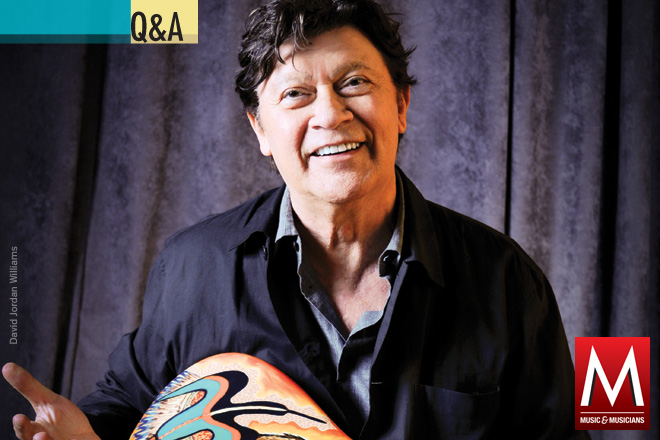ROBBIE ROBERTSON
Finding good medicine by fearlessly facing his past
Robbie Robertson always avoided addressing touchy subjects like his early days with the Band, his decision to leave the group in 1977, and his wild times during those days with his longtime collaborator, movie director Martin Scorsese. But on How to Become Clairvoyant, his first new album in 13 years, the Toronto-born singer, songwriter, guitarist and film-music composer tackles such topics head-on. “I was always more comfortable writing mythical songs that disguised personal feelings, but this record wasn’t like that,” he says of the album, which includes guest turns from friends like Eric Clapton, Steve Winwood, Trent Reznor, Tom Morello and Robert Randolph. “Now it feels very comfortable, like good medicine.”
Why so long between albums?
I’ve had my focus in different places in the last few years. When I had some good ideas and felt strongly about wanting to make a record, I followed that path.
How did you get started?
Eric was part of planting the seeds for this record. Some years ago we started talking about doing something together. We had done some things over the years, but this was an opportunity to get in a huddle and come up with song ideas. We toyed around, and a couple of years ago I ran across those sessions. I called him and said, “We did more than I thought we did—there are good ideas there.” So he said, “Let’s go in the studio and see what happens.”
How did you pick your guests?
It was about their skills. When I was in London recording and wanted an organ sound, Eric suggested Winwood, who I’ve known forever. It was beautiful, a lovely vibe. Tom Morello’s guitar playing fascinates me. Robert Randolph, too. And Trent Reznor and I are both in a cinematic place in our work.
You’re writing an autobiography. How did that come about?
This record had something to do with opening that door for me. People have come to me in the past about writing a biography. In the process of working with them, I came to the conclusion that I need to tell the stories myself. I’m looking forward to rolling up my sleeves, sitting down and telling the stories—and I’ve got a bunch of ’em.
Why don’t you tour anymore?
I got off the road in the ’70s because I started so young that I had learned everything I could. I wanted to be able to challenge myself in other ways, and being on the road made me feel like I was going to be in the same play for the rest of my life. The redundancy of that was not exciting. As much admiration and respect I have for people who go out and tour forever, they have an attachment to the road that I don’t anymore.
What have you learned from working with Scorsese?
Working with Marty is something I’ve always enjoyed, and I’ve been doing it for a long time now. Every time I work on a project it challenges me—especially if it’s a situation where I don’t know what to do, and I have to figure it out. Like the last film, Shutter Island [2010]: I proposed all modern classical music and composers. I knew something about them, but by the time I was done working with them I was an authority on modern classical music. Anytime I have an opportunity to expand my horizons, my knowledge, is a bonus.
–Nick Krewen




comment closed